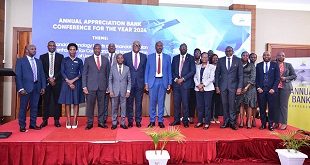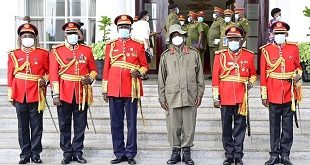
Kampala, Uganda | THE INDEPENDENT | The government has unveiled an online database for reporting and sharing information on human trafficking cases in Uganda. The database was launched at Kabira country club on Sunday during the commemoration of the International Day against trafficking in Persons, a day marked to raise awareness about human trafficking. The day was marked under the theme “Reach Every Victim of Trafficking, Leave No One Behind”.
One of the developers of the database, Gabriel Khaukha from Datatrack Solutions Consult, says that the database can be used to report cases of Human trafficking, follow up on cases and keep a history of victims and perpetrators. Khaukha explains that the police can log onto the database and input information about a suspected human trafficker for the office of the Directorate of Public Prosecution to commence prosecution.
Khaukha further explains that the program has been configured to assign each victim and perpetrator a unique ID to enable responsible agencies to establish repeat offenders and victims. The program can also be used by the government to refer victims to certified civil society organizations to undergo rehabilitation. Khaukha says the program shall ease access to data, reporting, and follow-up on cases.
The database to be managed at the Ministry of Internal Affairs shall be rolled out first in 15 border districts where rampant cases of human trafficking go unreported. According to Lt. Gen. Joseph Musanyufu, the Permanent Secretary of the Ministry of Internal Affairs, Uganda shares 2698km of borderline with 5 different countries but the immigration office controls only 67 points. This Musanyufu says shows the glaring gap in blocking channels used by human traffickers since the majority of borders are open.
Musanyu says Uganda is not only a source but also a transit and destination for human trafficking. And to curb this, he says, the country should plan ahead of the traffickers. He says this can be achieved through sensitization of the public, digitalization of services to ease and expand reach, and also dealing with the push factors such as poverty and unemployment.
According to the Police Annual crimes report of 2022, a total of 668 cases of human trafficking were reported in 2022, up from 362 cases in 2021. Commissioner of Police Julius Twinomujuni, the coordinator coordination office for the prevention of trafficking in persons at the Ministry of Internal Affairs says more than 60 percent of the victims of trafficking are women, girls, and the youth.
He explains that the majority of the victims are persuaded by the promise of jobs, school bursaries, and marriage. They are then trafficked into unwanted sexual and forced labor, especially domestic work. Twinomujuni says there are efforts to prevent and rescue victims of human trafficking. He however decried the insufficiency of shelters where victims can be rehabilitated and empowered economically so that they don’t fall victim to trafficking again as they fall for false job or bursary offers.
Apparently, the majority of the shelters available in the country are owned and run by civil society. But these service providers are yet to be well coordinated to provide systematic service to the victims. The NGOs under their network, Coalition Against Trafficking in Persons Uganda-UCATIP have now developed a digital directory that shall help them coordinate their activities well and ease service delivery to victims.
The directory launched at the same event was developed by Anthony Charles Mubiru, the programs manager at Dignified formerly Help the Street Girl Uganda and board member of UCATIP. Mubiru explains that the directory lists at least 50 NGOs in that field of work. He says, using the directory, one can find an organization to help rescue a victim of human trafficking and also get shelter to be rehabilitated.
Each NGO has an account on the digital directory which they can use to update information regarding their organisation. That way, Mubiru explains, when someone logs onto the website and seeks a particular service, only NGOs in a position to offer that very service at the time shall be listed. That way, he explains, a person will not have to call all NGOs to find out for instance, which one has space to accommodate a victim.
Annette Kirabira, the board chairperson of Coalition Against Trafficking in Persons Uganda(UCATIP) asked the government to create more partnerships with Civil Society in the fight against human trafficking. She says the government should establish Public Private Partnerships with civil society to start and manage shelters among other services needed by victims of human trafficking.
According to Rachel Bikhole, an Assistant Director of Public Prosecutions and Coordinator of Human Trafficking Cases in the Office of DPP, in the last two years, the office has enhanced prosecution of human trafficking cases and in 2022, registered 73 convictions compared to 30 convictions in the previous year. She says, successful prosecution not only delivers justice to the victims but also serves as a deterrent measure to traffickers as perpetrators are punished for their crimes.
The Chief of Mission of the International Organisation for Migration Sanusi Tejan Savage says globally, over 10 million people fall victim to human trafficking, and the majority of these are women, who remain unsupported. He says governments should change policies that cripple the fight against human trafficking and also allocate more resources to agencies and programs that facilitate the fight against human trafficking.
****
URN
 The Independent Uganda: You get the Truth we Pay the Price
The Independent Uganda: You get the Truth we Pay the Price


